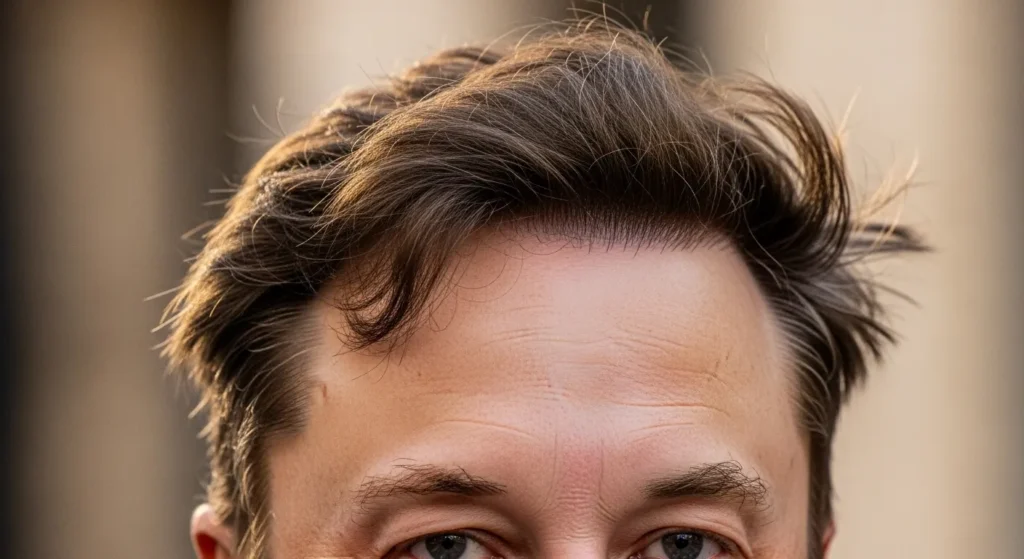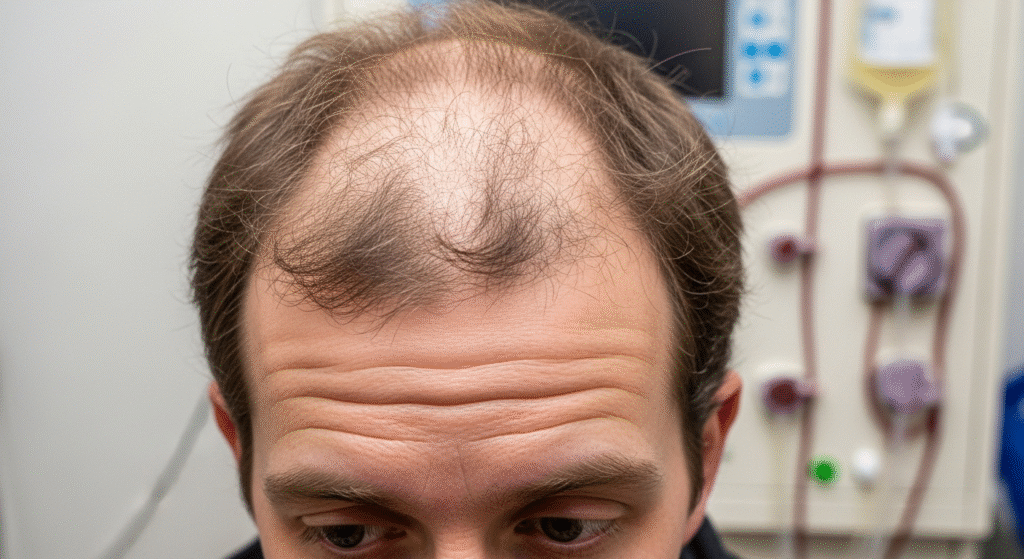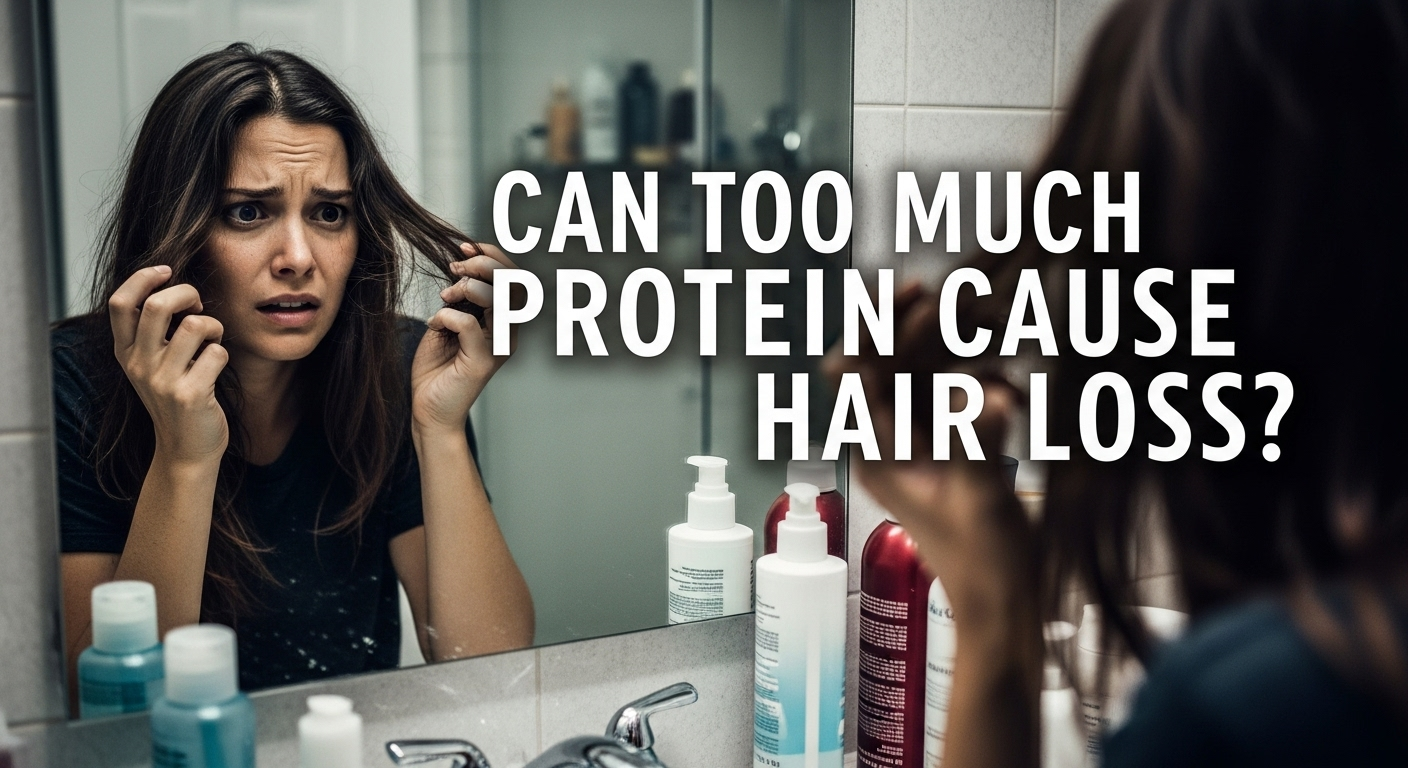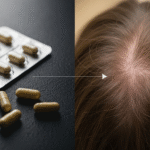Many people focus on protein to build muscle and support overall health, but could too much protein be causing unintended consequences for your hair? Can too much protein cause hair loss? This is a common concern for individuals looking to enhance their health, but unsure of the balance between protein and hair health. In this …
Many people focus on protein to build muscle and support overall health, but could too much protein be causing unintended consequences for your hair? Can too much protein cause hair loss? This is a common concern for individuals looking to enhance their health, but unsure of the balance between protein and hair health.
In this article, we’ll explain the connection between excessive protein intake and hair loss, outline the symptoms to look out for, and provide expert tips on how to maintain a healthy hair growth cycle. By understanding this balance, you can avoid the risks of hair thinning caused by protein overload.

Understanding Protein’s Role in the Body and Hair Growth
What is Protein and How Does It Affect Hair Health?
Protein is a vital macronutrient that your body needs for many functions, including the production of enzymes, hormones, and muscle tissue. It’s also a major building block for hair, as hair follicles are primarily composed of keratin, a type of protein. A healthy intake of protein is essential for strong, thick hair, as it supports the growth of new strands and helps maintain the health of existing hair.
Key benefits of protein for hair health:
- Supports the growth phase of hair (anagen phase).
- Helps maintain strong hair strands and prevents breakage.
- Essential for the regeneration of damaged hair and repair of follicles.
The Relationship Between Protein and Hair Growth Cycles
Hair goes through several cycles: the anagen (growth) phase, catagen (transition) phase, and telogen (resting) phase. Protein plays a significant role in the anagen phase, where hair grows rapidly. Adequate protein ensures that the body has enough resources to produce keratin, promoting healthy and resilient hair.
Can Too Much Protein Cause Hair Loss
The Effects of Excess Protein on the Body
While protein is crucial for hair health, too much of it can lead to a variety of problems. When the body consumes more protein than it can use, the excess is processed by the kidneys, and any surplus is excreted in urine. However, overconsumption of protein can stress the kidneys, lead to digestive issues, and potentially cause imbalances in other nutrients that are vital for hair health, such as vitamin A, iron, and zinc.
Signs of excessive protein intake include:
- Digestive discomfort, such as bloating or constipation.
- Increased strain on kidneys.
- Dehydration due to excessive nitrogen waste.
Hair Loss from High Protein Intake: What the Science Says
Research has shown that consuming too much protein can contribute to hair loss, especially when there’s an imbalance between protein and other essential nutrients. A high-protein diet can lead to telogen effluvium, a condition where more hair enters the resting phase, causing excessive shedding.
Scientific studies highlight that this is more likely to occur if the protein intake is extremely high, typically exceeding 2 grams per kilogram of body weight per day for an extended period.
Identifying the Signs of Protein-Induced Hair Loss
How to Recognize Hair Loss Caused by Protein Overload
Excessive protein intake can lead to noticeable changes in hair texture and an increase in hair shedding. If you notice that your hair feels thinner, weak, or dry, and you’re also consuming high amounts of protein, this could be a sign that your body is not able to process the surplus protein properly.
Signs of protein-induced hair loss include:
- Increased shedding, especially during washing or brushing.
- Noticeable thinning of hair at the crown or along the hairline.
- Dry, brittle hair that breaks easily.
Other Factors That Contribute to Hair Loss (Beyond Protein)
It’s important to note that hair loss is often multifactorial. While protein overload can contribute to hair thinning, other factors such as stress, hormonal changes, genetics, and nutrient deficiencies can also play a role. It’s essential to rule out these other causes before attributing hair loss solely to protein intake.
How Much Protein is Too Much for Hair Health?

Recommended Daily Protein Intake for Healthy Hair
While the recommended daily protein intake varies depending on age, gender, and activity level, the average adult needs about 0.8 grams of protein per kilogram of body weight. For those involved in regular exercise or bodybuilding, this requirement may increase to 1.2–1.7 grams per kilogram.
However, going beyond these amounts could put stress on the kidneys and may lead to an imbalance in essential nutrients for hair health. If you’re experiencing hair loss, it may be a good idea to reduce your protein intake and focus on a balanced diet with proper vitamins and minerals for hair growth.
How to Adjust Protein Intake for Balanced Hair Health
To ensure a healthy balance between protein and hair health, consider:
- Monitoring protein intake and not exceeding the recommended daily amount for your body type.
- Including a variety of protein sources, such as plant-based proteins, to avoid an overload of animal protein.
- Consulting a nutritionist or dietitian to develop a balanced diet that supports overall health, including hair health.
Expert Insights on Protein and Hair Loss Prevention
Preventive Measures: How to Protect Your Hair from Protein Overload
To avoid the risks of protein-induced hair loss, experts recommend:
- Avoiding extreme protein diets unless medically advised.
- Including a variety of foods in your diet to ensure nutrient balance.
- Drinking plenty of water to help flush excess protein from your system and support overall health.
FAQs
Can Protein Shakes Cause Hair Loss?
Protein shakes themselves aren’t likely to cause hair loss unless consumed in excessive amounts. It’s the overconsumption of protein—especially from supplements—without balancing other nutrients that can contribute to hair thinning.
How Long Does It Take to See Hair Loss from Too Much Protein?
The timeline for hair loss due to protein overload can vary, but noticeable hair shedding may begin within 2–3 months of excessive protein intake. It typically occurs once the body starts to struggle with processing the excess protein.
Can I Prevent Hair Loss Caused by Protein?
Yes, by moderating protein intake and ensuring a balanced diet, you can prevent hair loss. It’s important to focus on a holistic approach to health, with attention to protein, vitamins, and minerals.
Conclusion: Achieving a Healthy Balance for Hair and Health
In conclusion, while protein is essential for hair growth, too much of it can lead to unwanted hair loss. By monitoring your protein intake and ensuring a balanced diet with essential vitamins and minerals, you can support healthy hair growth and prevent unnecessary shedding.
Ready To Take Your Next Step
Book a Consultation with Dr. Uzma Irfan, an ISHRS-certified surgeon in Islamabad today to assess your protein intake and learn how to maintain a healthy, balanced diet for optimal hair health. Protect your hair and health with expert guidance.






